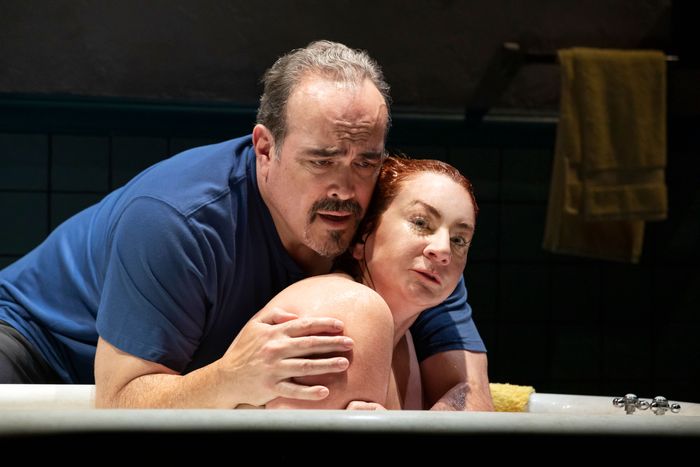
Martyna Majok’s 2018 Pulitzer winner, Cost of Living, has finally arrived on Broadway, and don’t be fooled by the Hallmark-esque advertisements or the Enya-sounding New Age music that plays between scenes: This is a remarkable (and remarkably unsentimental) look at who we are, what we have, and what we’re able to be for ourselves and others. It’s the kind of play that feels too real and too quietly observed for a landscape insistent on broad emotional swings and easy politicization.
Premiering at the Williamstown Theatre Festival in 2016 and then Off Broadway at City Center in 2017, Cost of Living charts two couples testing out what their new relationships look like, power imbalances and all. The better-defined and most engaging is the one between Eddie (David Zayas) and Ani (Katy Sullivan), a recently separated married couple who have reunited after an accident leaves Ani a quadriplegic. Eddie, kind-hearted, friskily Nuyorican, and abashed at having taken up with someone else shortly after their split, volunteers to care for Ani despite her initial discomfort and her skepticism when he suggests that painting her walls yellow will fix all her serotonin-depletion problems. But neither of them has enough money for luxuries like health care, so here they are.
Less satisfying is the pas de deux between John (Gregg Mozgala), a haughty Princeton Ph.D. student — he just moved from Cambridge? You know, near Boston? — with cerebral palsy, and Jess (Kara Young), his foreign-born caregiver who is struggling through the gig economy despite having her own Ivy League degree. The differences between these two are more pronounced and give Majok and director Jo Bonney chances to wonderfully subvert our expectations of, and allegiances to, each of them. Jess is attractive, likable, able-bodied, and poor; John is wealthy, white, kind of a dick, and dependent on her. But the clash of their identities, despite lending itself to some great back-and-forths about how we judge one another, forces Majok into making the progression of their relationship less nuanced and more forced than that of the married couple. If Eddie and Ani’s story pulls you in through the gravity of its emotional truth, the writerly machinations of Jess and John’s may put you off — surprising, considering Cost was developed from an earlier short play, John, Who’s Here From Cambridge.
Majok is an ingenious crafter of plot, however, and even when the gambles she takes with her characters verge dangerously close to the unbelievable, they pay off in the end. A late-in-the-game altercation between Jess and John happens after a highly implausible flirtation and comes close to derailing their entire arc before the playwright arrives at the devastating point B she had planned all along. Your mileage with this will vary on how forgiving you are with momentary lapses of credibility.
Majok’s play is mostly very clear-eyed but could become pure sap in the wrong directorial or actorly hands. Bonney’s smooth direction and the performances of Mozgala and Sullivan, who have been with the play since Williamstown, keep that from happening. The actors themselves possess their characters’ respective disabilities, and their unfussy ease with the roles helps the play skirt any potential sentimentality. Sullivan in particular packs histories of hurt into her performance, and watching Ani’s defiant pride slowly give in to Eddie’s earnest advances is frighteningly recognizable. She and Zayas create a palpable portrait of the complications that arise out of shared pain and attraction.
Zayas’s performance is near-revelatory, commanding attention with a sweet-natured charisma and deep sense of pathos in the play’s opening monologue — a remarkable barstool meditation on everyday blessings, relationships, and sobriety that’s as touching as it is funny — and sustaining those throughout what could have been an easy trap for mawkishness. Playing neither a martyr nor a sleazy Jersey trucker who cheated on his newly disabled wife, Zayas has an inviting, expressive face that drives the play’s most naked desire for connection; Eddie’s through-line, after all, is to win back his wife. It also shoulders the bulk of the play’s humor, with his corny self trying to get a laugh out of Ani by dancing, or unwittingly getting a laugh from us by referencing the pseudoscientific “miraculous shit” he’s seen on YouTube.
If his work was the production’s most welcome surprise, the same cannot be said of Young’s performance — if only because to fall headfirst for one of her characters is to have seen Kara Young act at all. There is something unpinnable about her that feels vigorously fresh with each new performance, dating to her one-two punch of Atlantic Theater Company’s Halfway Bitches Go Straight to Heaven and All the Natalie Portmans at MCC three seasons ago. She strikes an intensely watchable balance between a star’s recognizable “Ah, there she is” X factor and a character actor’s ability to disappear into a role.
“It is sometimes real nice to just think about someone’s weather,” Ani tells Eddie during a tender and charged bath. She’s drained by the emotionally fraught exchanges she has been having with her husband and longs for the inconsequential chatter she would have with her old nurse. That the line is spoken during a climactic scene is a good example of Majok’s adroitness at marrying the mundane to the profoundly, terrifyingly human. Cost of Living is as much about struggling to make financial ends meet as it is about emotional ends, the feelings and impulses that keep us going or hold us back. Like centripetal and centrifugal forces, Wilson Chin’s sparse, elegant turntable set suggests that the things that tie us down can also move us forward.
Cost of Living is at the Manhattan Theatre Club’s Samuel J. Friedman Theatre.




